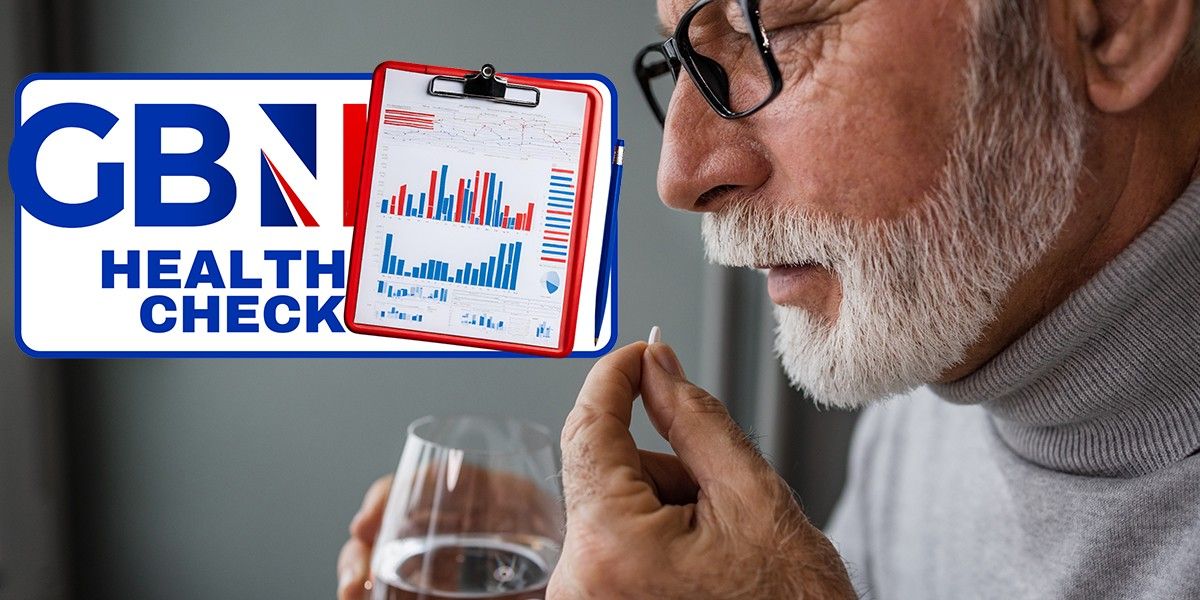The vitamin and supplement industry is booming: the United Kingdom saw a combined turnover of £1.5billion last year.
This explosion of interest has led many Britons to try and supplement their way to a healthier heart.
It’s an understandable approach – heart and circulatory diseases cause a quarter of all deaths in the UK – but is it even possible?
The general consensus among doctors and dieticians is that most people should be able to get all the nutrients they need to maintain a healthy heart from a balanced diet.
Low vitamin D levels have also been found in patients with heart failure
Getty Images
Indeed, government guidance on the prevention and management of coronary heart disease (CHD) does not recommend the use of dietary supplements, notes Victoria Taylor, senior dietitian at the British Heart Foundation (BHF).
And eating a healthy nutritious diet is “far preferable” to spending exorbitant sums on supplements that do not achieve the same outcome, says Deborah Lee of Dr Fox Online Pharmacy.
Taking too much or taking them for too long can also prove harmful, warns Dr Hana Patel, an NHS doctor based in the South East of England.
That being said, evidence has associated the use of some supplements with improved cardiovascular outcomes.
For example, A BMJ study published last year concluded vitamin D supplementation might reduce the incidence of major cardiovascular events.
Low vitamin D levels have also been found in patients with heart failure.
And some studies have linked atrial fibrillation – a heart condition that causes an irregular and often abnormally fast heart rate – to low vitamin D levels, but studies have been conflicting.
“A supplement of vitamin D is recommended for people in the UK during the autumn and winter months to protect the health of our bones and muscles,” said Ms Taylor.
According to Dr Patel, supplementing with omega-3 has also shown promise, but again the evidence is inconsistent.
A meta-analysis, which included data from over 10 studies, found fish oil omega‐3 supplements lowered risk for heart attack and death from coronary heart disease.
The STRENGTH trial, published in JAMA, casts doubt over these results.
The study looked at a different formulation of omega-3 fish oil — a combination of eicosapentaenoic acid (EPA) and docosahexaenoic acid (DHA) — to see if it would also reduce cardiovascular risk.
This study enrolled over 13,000 patients who were randomized to receive either the EPA/DHA combination pill or the placebo (a pill filled with corn oil). The trial was terminated early due to an interim analysis revealing no difference between the two treatment groups.
Your best bet is to pack omega-3 into your diet. The BHF says that oily fish are the best source of EPA and DHA omega-3 fats but there are also small amounts in white fish and shellfish.
LATEST DEVELOPMENTS

Supplements can prove harmful if you take too many, warns the BHF
PA
How about multivitamins?
Dr Patel cites the the Physicians’ Health Study II, the only randomised controlled trial (RCT) testing daily multivitamins on total CVD events.
RCTs are regarded as the gold standard trial for evaluating the effectiveness of interventions.
The study found no effect on total CVD; however, a significant 39 percent reduction in fatal heart attacks was observed.
Again, the evidence is conflicting. A large study looking at more than two million people concluded that taking a multivitamin doesn’t reduce your risk of heart and circulatory problems.
So, what you should do?
Eat well
For Dr Lee, the most important thing for heart health is to eat a healthy balanced diet, full of brightly-coloured fruits and vegetables as these are full of health-giving antioxidants, which have cardioprotective effects, as well as lean protein, healthy unsaturated fats and whole grains.
The Mediterranean diet ticks many of these boxes and the evidence is encouraging.
A 2023 systematic review and meta-analysis of prospective studies published last year found that women who most closely followed the Mediterranean Diet had a 76 percent reduced risk reduction of heart disease.
A Mediterranean diet focuses on plant foods like fruit, vegetables, wholegrains, nuts, seeds, and pulses, like, beans, chickpeas and lentils. The diet includes moderate amounts of lean proteins like fish and chicken and low-fat dairy foods. Olive oil is used to replace other oils and fats in the diet.
It’s not only what you eat but what you don’t that counts. Health bodies, such as the BHF, advise limiting saturated fats, which are commonly found in butter, lard, ghee, fatty meats and cheese.
Too much saturated fat is associated with raised levels of non-HDL (bad) cholesterol – a risk factor for heart and circulatory disease.
How much is too much?This is open to debate but the government generally recommends that men should not eat more than 30g of saturated fat and women should not eat more than 20g of saturated fat a day.

Engaging in as little as 30 minutes of exercise day can keep your heart healthy, claims one doctor
Getty Images
30 minutes of activity
For Doctor Gareth Nye, Programme Lead for Medical Science and Chester Medical School, the “very best” thing you can do is engage in 30 minutes of activity a day.
This could be walking at a brisk pace, running or swimming.
Essentially anything that raises your heart rate, he said.
A simple hack is to simply up your step count. A study published last year found notching up anywhere between 2,600 and about 2,800 steps a day yields significant mortality and CVD benefits.
And the more you walk, the greater the health benefits. The risk of dying from any cause or from cardiovascular disease decreases significantly with every 500 to 1000 extra steps you walk, according to the world’s largest study.
Increasing the intensity of your workouts may bring greater benefits too. There is substantial evidence that vigorous activity can bring health benefits over and above that of moderate activity.
You can tell when it’s vigorous activity because you’re breathing hard and fast, and your heart rate has gone up quite a bit.
Examples include:
- Lifting heavy weights
- Circuit training
- Sprinting up hills
- Interval running
- Running up stairs
- Spinning classes
In conclusion
There may be a place for supplements in the diets of specific groups of people, such as young children, pregnant women and the elderly, but for most Britons, vitamin and mineral tablets are not necessary unless they have been prescribed by a health professional.
It’s also worth remembering that, while taking extra vitamins and minerals can seem like a harmless addition to your diet, it’s possible to have too much of a good thing, she notes.
“In tablet form, vitamins and minerals are more concentrated than in food, and more is not always better.
“If you’re thinking about taking a supplement that hasn’t been prescribed or recommended by a health professional, talk to your doctor before spending your money,” added Ms Taylor of the BHF.

Sarah Carter is a health and wellness expert residing in the UK. With a background in healthcare, she offers evidence-based advice on fitness, nutrition, and mental well-being, promoting healthier living for readers.








